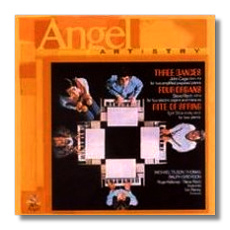
The Internet's Premier Classical Music Source
Related Links
- Latest Reviews
- More Reviews
-
By Composer
-
Collections
DVD & Blu-ray
Books
Concert Reviews
Articles/Interviews
Software
Audio
Search Amazon
Recommended Links
Site News
 CD Review
CD Review
Angel Artistry

- Igor Stravinsky: The Rite of Spring
- John Cage: Three Dances
- Steve Reich: Four Organs
Michael Tilson Thomas, Ralph Grierson, pianos, amplified prepared pianos, and electric organs
Roger Kellaway, Steve Reich, electric organs
Tony Raney, maracas
Angel 67691 ADD 79:52
Two LPs first issued in the early 1970s are making their CD debut with this single release. The Summer of Love was not far behind, and Michael Tilson Thomas already had made a mark as a hip young conductor in the style of Leonard Bernstein with his vibrant concerts as Assistant Conductor of the Boston Symphony Orchestra. Like Bernstein, Tilson Thomas also was an accomplished pianist, and a strong advocate for new music, especially music by American composers.
The repertoire included on this CD presents him in all of these roles. Stravinsky's Rite of Spring exists in a reduction for two pianos for the convenience of choreographers; the composer never intended this reduction to be performed as a concert work, let alone recorded. Nevertheless, Stravinsky did not object to its performance, commenting, "Why not? I wrote it." Apparently Tilson Thomas and Grierson were the first pianists to record this reduction. (They performed the work together "live" as early as 1967.) Since then, many other pianists have followed suit. There's no pretending that the two-piano version even approaches the orchestral original in terms of excitement and innovation, but the music's skeleton is fascinating enough (and very much alive), and there's a different kind of excitement involved in hearing two pianists conquer difficulties normally faced by a hundred orchestral musicians. Tilson Thomas and Grierson are up to the challenge, although they don't make the listener forget the orchestral version. Candidly, Angel includes a warning about "uncorrectable distortion present on the original analog master tapes." Fortunately, it's not bad enough to compromise the performance.
Three Dances, written in 1945, is a highpoint of Cage's music for prepared piano, or, in this case, two prepared pianos. Cage gives meticulous instructions as to what objects, from bolts and felt strips, are to be inserted between which strings. The result is not the sound of a piano but the sound of a whole percussion orchestra. The ostinato rhythms and other exotic complications produce music that seems to come from the Far East. Listeners who associate Cage's music with the arbitrary and the recherché might find Three Dances much more to their liking. Tilson Thomas and Grierson play this music with passionate commitment.
To the relentless shaking of maracas, four electric organs inflate and deflate a dominant eleventh chord through the addition and subtraction of pitches and durations. That's all there is to Four Organs. It's crazy, but if you surrender to it, it's hypnotically enjoyable. (In 1970, at the New York première, one attendee ran for the exit, screaming, "All right, I'll confess!") Tilson Thomas, Grierson, Kellaway, and Reich himself (historical value here!) tackle the organ parts with indomitable seriousness, and Tom Raney, the unsung hero of the recording, shakes his maracas tirelessly.
The original liner notes have been included, so we get to read Tilson Thomas's interesting comments about the Three Dances and Reich's equally interesting comments about Four Organs. Extended notes about Stravinsky's Scherzo à la Russe are out of place, however - this work apparently was included on the LP with The Rite of Spring, but you won't find it on this CD! Apart from the above-noted reservation, the analog recording still sounds great.
Copyright © 2002, Raymond Tuttle


















